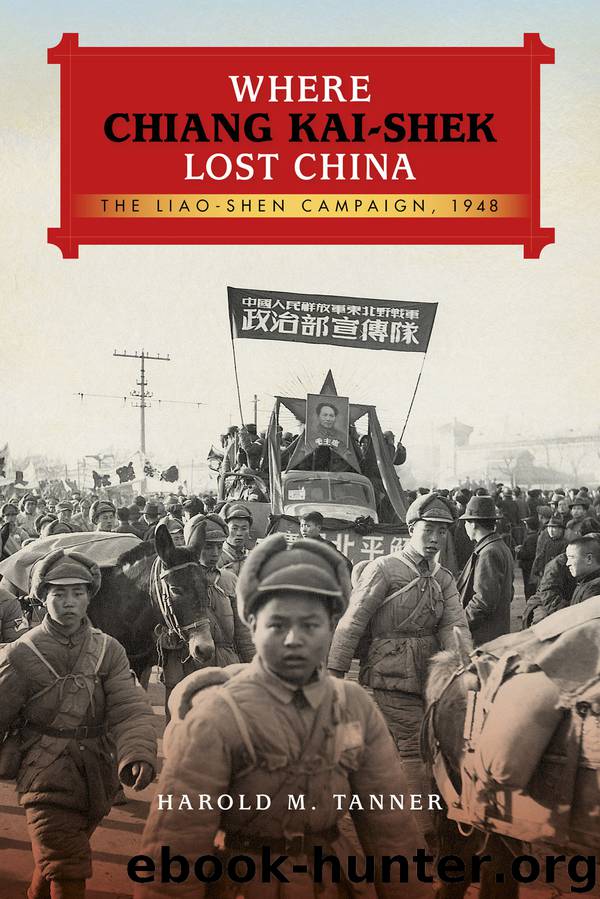Where Chiang Kai-shek Lost China by Harold M. Tanner

Author:Harold M. Tanner
Language: eng
Format: epub
Publisher: Indiana University Press
Published: 2015-01-21T16:00:00+00:00
LIN BIAO’S HESITATION
The feasibility of Chiang’s plan of action can be gauged by Lin Biao’s reaction: it nearly caused him to call off the attack on Jinzhou. To understand why, and what happened, we need to backtrack again, to 26 September, when Lin’s forces had still not completed the three tasks essential to any attack on Jinzhou: the cutting of the Bei-Ning line, the occupation of key positions around Jinzhou, and the capture of Yixian. As those three tasks were under way, Lin Biao and Mao Zedong continued to debate their operational plans. Lin, Luo, and Liu suggested that after taking Yixian, they would target Jinxi, Xingcheng, and then Shanhaiguan, which was still under Nationalist control: if the Nationalist forces abandoned Shanhaiguan voluntarily, then Lin would attack Jinzhou instead.58 Mao responded that Lin should either attack Jinzhou and Shanhaiguan simultaneously or, if that were not feasible, then attack Jinzhou first, “because if you attack Shanhaiguan and bring your troops back to attack Jinzhou, it is more exhausting for the troops, and it gives the enemy in Shenyang a chance to reinforce Jinzhou. If you attack Jinzhou first, the enemy in Shenyang won’t have enough time to reinforce Jinzhou; they will sink into paralysis, whereas we can move on to attack Shanhaiguan, Luanxian, Tangshan and, if possible, occupy Huludao and Qinhuangdao.”59 This convinced Lin, Luo, and Liu that they should make Jinzhou their next target. By 29 September, they saw the possibility that this operation would be more than just another stage in the long struggle for supremacy in the Northeast: it had the potential to be a major decisive battle in which they would capture both Jinzhou and Changchun and wipe out the Nationalist reinforcements coming out of Shenyang.60
Mao, who knew that Chiang had been meeting with Wei Lihuang and the other generals, believed that Wei was planning to extract his troops from Changchun because (as Mao saw it), this was the only way he could get enough troops to reinforce Jinzhou. As we have seen, Chiang’s plan to send the West-Advancing Army Corps out of Shenyang was not predicated on a withdrawal of troops from Changchun (although Chiang certainly wanted that to happen as well). But what is important here is Mao’s belief. Mao’s estimate was that it would take ten days for Wei to extract the forces from Changchun, and another ten days to deploy them to Jinzhou: Mao warned Lin Biao to keep this twenty-day time frame in mind when it came to his plan of attack for Yixian, Jinzhou, and Jinxi.61
As these discussions progressed, Lin Biao was moving his headquarters from Harbin south toward the front line. This required two trains. The first train, six passenger cars and four freight cars, carried radio equipment and Lin’s intelligence staff—six teams of men and women serving in shifts, monitoring Nationalist radio traffic twenty-four hours a day. Lin, Luo Ronghuan, Liu Yalou, and other staff officers and personnel followed in a second train. As the two trains moved south,
Download
This site does not store any files on its server. We only index and link to content provided by other sites. Please contact the content providers to delete copyright contents if any and email us, we'll remove relevant links or contents immediately.
| Central Asia | Southeast Asia |
| China | Hong Kong |
| India | Japan |
| Korea | Pakistan |
| Philippines | Russia |
The Rape of Nanking by Iris Chang(3530)
The Sympathizer by Viet Thanh Nguyen(3528)
World without end by Ken Follett(3016)
Ants Among Elephants by Sujatha Gidla(2930)
Blood and Sand by Alex Von Tunzelmann(2615)
Japanese Design by Patricia J. Graham(2564)
City of Djinns: a year in Delhi by William Dalrymple(2140)
Inglorious Empire by Shashi Tharoor(2106)
In Order to Live: A North Korean Girl's Journey to Freedom by Yeonmi Park(2063)
Foreign Devils on the Silk Road: The Search for the Lost Treasures of Central Asia by Peter Hopkirk(2061)
Tokyo by Rob Goss(2025)
India's Ancient Past by R.S. Sharma(1992)
India's biggest cover-up by Dhar Anuj(1990)
The Great Game: On Secret Service in High Asia by Peter Hopkirk(1964)
Tokyo Geek's Guide: Manga, Anime, Gaming, Cosplay, Toys, Idols & More - The Ultimate Guide to Japan's Otaku Culture by Simone Gianni(1953)
Goodbye Madame Butterfly(1942)
The Queen of Nothing by Holly Black(1768)
Living Silence in Burma by Christina Fink(1738)
Batik by Rudolf Smend(1726)
